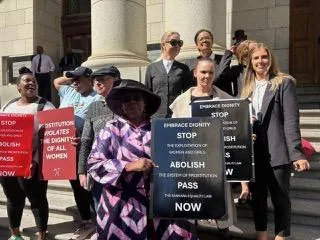
Nozizwe Madlala-Routledge, a co-founder of Embrace Dignity, with supporters on the steps of the Western Cape High Court.
Image: Supplied
In a significant move resonating with national implications, the Embrace Dignity Coalition has intervened in the landmark SWEAT challenge at the Western Cape High Court, whereby legal arguments were presented advocating for the total decriminalisation of prostitution. This case, unfolding over two days, saw Judge Andre Le Grange presiding over a crowd of supporters, legal representatives, and survivors who emphasised the urgent need to re-evaluate the existing laws governing the world’s oldest profession.
As court sessions progressed on 1 and 2 September, Judge Le Grange admitted numerous organisations into the case as amici curiae (friends of the court), including Embrace Dignity, which stands in stark opposition to the push for decriminalisation. With the South African government choosing to abstain from contesting the challenge, the stance taken by Embrace Dignity underlines a clear deviation from the administrative silence on an issue fraught with social implications.
Nozizwe Madlala-Routledge, a co-founder of Embrace Dignity, articulated the need for an alternative to total decriminalisation proposing instead the Sankara Equality Law, a survivor-led approach modelled after the Equality Model Law pioneered by Sweden. This framework prioritises the criminalisation of demand while offering support for those seeking to exit the system of prostitution, demonstrating a compassionate and practical understanding of the complexities rooted within sexual trade.
“Embrace Dignity is vehemently opposing the idea that the decriminalisation of the violent system of prostitution should be accepted as the norm across South Africa,” Madlala-Routledge stated on the steps of the High Court, flanked by survivors who shared their harrowing experiences. “By failing to oppose the decriminalisation, the government signals that the lives of women and girls do not matter.”
Echoing Madlala-Routledge’s sentiments, Abigail, a survivor of sex trafficking, presented poignant questions that encapsulate the urgent need for reform. “Why do we have so many vulnerable individuals entering the industry but only one kind of buyer? I will not be silenced on this topic because I have experienced first-hand my freedom taken from me. Full decriminalisation will create an environment for human trafficking to thrive, and we will not have it.”
Sisipho, another young supporter, voiced a sentiment that resonated within many: “I doubt any young woman in South Africa dreams of prostitution as a viable career path. Our bodies should not be exploited in the name of ‘work’.”
The findings from countries that have legalised or decriminalised prostitution, such as Denmark and Germany, paint a concerning picture. Madlala-Routledge pointed out that these nations exhibit a higher rate of individuals involved in prostitution while showing no significant alleviation in violence or murder rates. Instead, the protection offered through supportive means like the Equality Model showcases that combating the systemic issues surrounding sex work can be achieved through enforcement against buyers, not the exploited.
Supporters of the Equality Model argue that legalising the buying of sex would only worsen the situation for women in vulnerable positions. Max Waltman, an Assistant Professor at Stockholm University, warned that legalisation can effectively legalise abuse, making it harder for victims to assert their rights. In South Africa’s context, where survivors are primarily poor black women, a shift towards legalising prostitution threatens to worsen existing inequalities.
Madlala-Routledge elucidated on the broader implications of legalising prostitution and how it starkly contrasts with the principles outlined by Nelson Mandela, who championed dignity, equality, and human rights for all. “Legalising prostitution will not free women; it will entrench their oppression.” This echoes harsh truths about the social landscape preserved under the guise of ‘choice’ and ‘employment’ in an industry rife with exploitation and abuse.
The survivors at the forefront of this advocacy are calling for a shift in discourse, demanding the abolition of the prostitution system rather than its legalisation or full decriminalisation. Their requests include comprehensive exit services, criminal penalties for traffickers and buyers, protective measures for survivors, and the urgent adoption of the Sankara Equality Law as a viable framework. “South Africa must not become a pimp state,” concluded Madlala-Routledge, rallying supporters to stand together against policies that threaten the most vulnerable members of society
Related Topics: